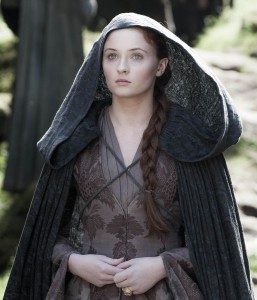Game of Gender Roles: Popular Culture and Women
 Sansa Stark (played by Sophie Turner) on HBO's Game of Thrones (Image via HBO)
Sansa Stark (played by Sophie Turner) on HBO's Game of Thrones (Image via HBO) June 14 marked the finale of the fifth season of the popular television show, Game of Thrones. This season has been particularly controversial in its depiction of the rape of a major character, which many critics and fans considered unnecessary and included purely for shock value. However, Game of Thrones is hardly the first piece of pop culture to portray women in ways that can be degrading and represent them as submissive and helpless. And in Game of Thrones’ defense, it also has many powerful female characters whose intelligence and ambition overshadow those of the men in their lives. In fact, looking at popular films, television shows, music, and books seems to reveal that we are living in a culture where images of women as assertive heroines coexist with depictions of women as passive entities.
On the big screen and in the pages of novels, for instance, we see Katniss Everdeen of The Hunger Games trilogy liberating the world from a totalitarian regime, but we also see Anastasia Steele of Fifty Shades of Grey being stalked by an abusive billionaire and calling his behavior “love.” We hear Beyoncé declaring herself a feminist and encouraging women’s empowerment while Megan Trainor sings a song to her “Dear Future Husband” that promotes traditional gender roles for women and men. On television, we watch Hillary Clinton declare her intentions to run for President of the United States, but we also watch Kim Kardashian preoccupy herself with makeup and shoes. Everywhere we look, women are making significant strides toward equality and agency, but they’re also taking two steps back toward subservience and objectification.
If these dismissive depictions of women existed purely within fiction, they might not be so worrisome. But outside of books and movies, women’s rights in the United States are constantly under siege, especially from fundamentalist Christians. A recent law in Texas that could close dozens of clinics across the state has been upheld. Even as Oklahoma Governor Mary Fallin signed a bill requiring public schools to teach sexual assault prevention, public schools across the nation teach scientifically unsound abstinence-only sexual “education” that reads more like conservative Christian propaganda than accurate information. The US Senate currently supports legislation that would legalize over-the-counter birth control pills, making access to contraception easier for many women, but the US Supreme Court’s decision on last year’s Hobby Lobby case privileged the religious convictions of businesses owners over the reproductive rights of their employees. Just like in popular culture, every instance of women’s empowerment in the political and social spheres seems to come with efforts to restrict women’s rights.
Popular culture reflects this polarization of women’s efforts toward equality, but it also contributes to it. When books, movies, television shows, and songs present women as passive and submissive, they’re upholding the same view of women espoused by conservative religious leaders—that women are not fully capable of shaping their lives or making their own decisions. That is, they are depicting women as less than fully human. As humanists and feminists, we should support popular culture when it gives us rich and complex female characters who exercise agency in their own lives while also vocally criticizing popular culture when it spits out one-dimensional or stereotypical female characters.
